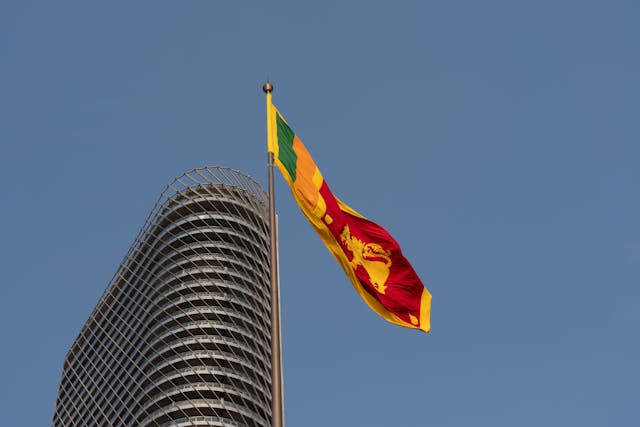Although players shouting ‘Monkey’ in casinos is a relatively common sight, the exact origins of the term and the story behind it are not completely clear. While there is no doubt that it hails from casinos in East Asia, there are multiple claims of how it came to be used.
We’ll go through a few popular theories, but you should probably take all of them with a grain of salt. Many are probably just myths thought up by players trying to understand how the word ‘Monkey’ came to be used in blackjack and baccarat.
The most likely theory is that it comes from the Mandarin word for ‘face card’. The word sounds a bit like ‘me-an-kah’, which may sound like ‘Monkey’ to English speakers with no knowledge of Mandarin. This theory implies that the term was spread through Chinese players in Western casinos as well as Asian gaming hubs like Macau.
While there is no direct evidence to support it, the theory makes a lot of sense since ‘Monkey’ largely describes face cards.
Another theory connects the term to the word for ‘nothing’ in Cantonese, similarly attributing it to a misunderstanding. According to these claims, ‘Monkey’ originally comes from Baccarat, where 10-value cards have a value of 0. It’s entirely possible that the term eventually spread to blackjack and other games.
Unfortunately, things only get hazier from there. Some myths connect the term’s use to other aspects of Asian culture, such as the connection between monkeys and good fortune.
Whatever the case, most people simply use the term as a playful way to express excitement at a blackjack table.
Why Players Want a “Monkey”
Cards with a value of 10 are widely considered to be good for players. To fully understand why that is, you should probably make sure that you at least know the basics of blackjack. If not, check out our blackjack tutorial to read up on the core rules and mechanics of the game.
So why are Monkeys, or 10-value cards, good for players?
Without going too deep into the maths and stats of blackjack, there are a few important points to consider:
- If drawn as one or more of the initial 2 cards a player receives, high-value cards help players reach 21 quickly. Since the goal of the game is to get as close to 21 without going over, drawing two such cards is a very quick way to get a very strong hand.
- A Natural 21, or Blackjack, can only be reached by drawing an Ace and a 10-value card. A Natural 21 wins instantly and pays more than a regular win, so it’s a clear goal for most players.
- Moreover, 10-value cards are actually the most common cards in a blackjack shoe. After all, 10 is the only card value represented by multiple card ranks: 10s, Jacks, Queens, and Kings. As such, a shoe that contains more such cards is more predictable and easier to win with.
- According to most table rules, dealers are required to keep drawing cards until they reach a dealer hand value of at least 17. That means that a 10-value card would cause a dealer to Bust if they already have a total of 12, 13, 14, 15, or 16. It’s also why most blackjack strategy charts avoid hitting on hands with totals from 12-16.
- Due to some of these reasons, 10-value cards are also highly valuable if you’re counting cards.
- 10-value cards can also be important for a number of side bets in blackjack.
When the Term ‘Monkey’ is Used in Blackjack
If you’ve ever come across this blackjack term before, it was likely shouted in excitement over a busy blackjack table.
Broadly speaking, there is no ‘correct’ way to use the term. It simply refers to 10-value cards, regardless of the context.
However, in most cases, players say ‘monkey in blackjack for one of two reasons:
- If they’re hoping to draw a 10-value card as they’re Hitting (or Doubling.) For example, if a player’s current hand value is 11, drawing a Monkey wound cause them to reach an exact score of 21 – the strongest possible hand in Blackjack, barring a Natural 21.
- If they’ve just drawn a 10-value card that is useful for their current hand. For example, let’s say a player has a hand value of 11 and decides to Hit. They draw a 10-value card and get to exactly 21, which would be cause for celebration. In some Asian casinos, many players would excitedly exclaim ‘Monkey!’ thanks to their good fortune.
- If the dealer draws a 10-value card, which causes them to Bust by going over 21. Again, this would be a good time to thank the ‘Monkey’ for showing up.
We probably don’t need to point out that understanding or using the term won’t really help you. It’s just jargon for certain cards that might show up regardless of how you call them. However, using such jargon gives some players a feeling of being “in the know”, thus enhancing their experience.
Put bluntly, it’s just a silly term used by certain blackjack players as a sort of inside joke, particularly in casinos in Asia.
Similar Blackjack Terms
Blackjack is famous across the world, and it boasts a storied history as well as a fairly involved player community. It should come as no surprise that there are plenty of other examples of slang, lingo, and creative lingo related to the game.
- Burn card – The top card in a freshly shuffled shoe, which is usually removed from the game.
- First base – The betting spot located immediately to the dealer’s left. It’s the first position to receive cards in a new round, which is why the term was borrowed from baseball.
- Fice-card Charlie – A special rule that allows players to instantly win regardless of their hand total as long as they draw 5 cards in a single round without busting. May require more cards in some cases, such as 6-Card Charlie, 7-Card Charlie, and so on.
- Hard hand – Any card hand that does not contain any Aces, which means it can only have a single blackjack hand value. Also refers to a hand that contains an Ace that can only count as 1 instead of 11.
- Heads-up – A game of blackjack with only one player facing off against the dealer. May refer to a table on which only one person is currently playing.
- Hole card – The dealer card that’s facing down after the initial deal. May also refer to the first two cards dealt to any hand in blackjack.
- Natural hand – A two-card total of 21, also simply called Blackjack.
- Pitch game – A game of blackjack in which the dealer deals cards directly from their hand, typically only using 1 or 2 decks.
- Shoe game – A blackjack game that uses a card shoe to store cards, as opposed to a Pitch game. Shoe games typically use more than 2 decks, which accounts for the majority of games played these days.
- Soft hand – A blackjack hand that contains an Ace that currently counts as 11. This means that the hand technically has two values, whichever is more favorable to the player. May also refer to the Soft 17 rule in blackjack.
- Third base – the last, usually seventh betting spot, located to the dealer’s right. It’s usually the last position to act in a round of blackjack.
- Ploppy – A beginner or low-skill blackjack player. Refers to the fact that newbies often just “plop” down at a table with no concern for strategy.
Popularity and Use of “Monkey” in Different Regions
If there is one thing that’s certain about the origins and use of the term, it’s that it originates from Asian casinos. Specifically, the term likely comes from Indonesia and certain parts of China. These are also the parts of the world where you’re most likely to hear it used.
According to some player testimonies, Cantonese-speaking Baccarat players will often shout the word “mo yair”, which translates to “nothing.” In this context, the players are hoping for the next card to be a “monkey”, which would effectively keep the current hand total as-is.
On the flip side, Indonesian players can often be heard shouting “monyet”, which also sounds similar to “monkey.” In this instance, players are often dissatisfied with having drawn a 10-value card, for reasons that depend on the game they’re playing and the current situation. In this example, the term is used as a sort of curse rather than a celebration.
As we’ve previously mentioned, the term “monkey” at casino tables is not a very common sight in the West. However, American casino-goers can usually hear it as “Monkey” because it has evolved into something more understandable and pronounceable to English-speaking players.
According to dealers and other casino-goers, even this evolved version of the term is primarily used by Asian players. However, while the exact use of related terms varies between countries and cultures, ‘monkey’ almost exclusively refers to face cards.
While we’re on the topic, we should probably mention that other cultures use the word ‘monkey’ as slang for other things which may or may not be related to gambling.
For example, in British slang, the word ‘monkey’ may refer to £500. The term is believed to come from the 500 banknotes for Indian rupees, which used to show a monkey. Apparently, the term was brought over to the UK by British soldiers returning from India.
Similarly, Australians sometimes refer to an A$500 note as a ‘Monkey’, which can sometimes be heard in casinos.









































 Roulette
Roulette
 Blackjack
Blackjack
 Baccarat
Baccarat
 Poker
Poker
 Sic Bo
Sic Bo
 Dragon Tiger
Dragon Tiger
 Game Shows
Game Shows  Top 5 Games
Top 5 Games  See more
See more  Roulette Casinos
Roulette Casinos  Low Limit
Low Limit  High Limit / VIP
High Limit / VIP  Exclusive
Exclusive  How to Play
How to Play  Basic Strategy
Basic Strategy  Top Tips
Top Tips  FAQ
FAQ  Blackjack Casinos
Blackjack Casinos  Baccarat Casinos
Baccarat Casinos  Bonuses
Bonuses  Poker Casinos
Poker Casinos  Game Providers
Game Providers  Sic Bo Casinos
Sic Bo Casinos  Dragon Tiger Casinos
Dragon Tiger Casinos  Credit and Debit Card
Credit and Debit Card  e-Wallet
e-Wallet  Cryptocurrency
Cryptocurrency  Bank and Checks
Bank and Checks  Pay by Phone and SMS
Pay by Phone and SMS  See more
See more  How-To Guides
How-To Guides  Top Lists
Top Lists  In-Depth
In-Depth  Strategy
Strategy  Casino & Games
Casino & Games  Insight
Insight  News
News  Promotions
Promotions 
 Guide to Live Casinos
Guide to Live Casinos  Top 10 Live Casino Tips
Top 10 Live Casino Tips  Studio Locations
Studio Locations  FAQ & Help
FAQ & Help  Meet The Dealers
Meet The Dealers  Our Awards
Our Awards  How We Rate
How We Rate  Responsible Gambling
Responsible Gambling 




























 ENG
ENG 






 Facebook
Facebook
 Pinterest
Pinterest
 Twitter
Twitter
 LinkedIn
LinkedIn
 Copy Link
Copy Link 






























